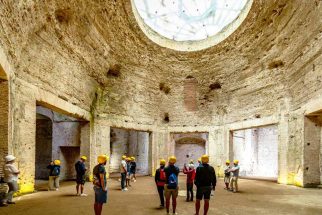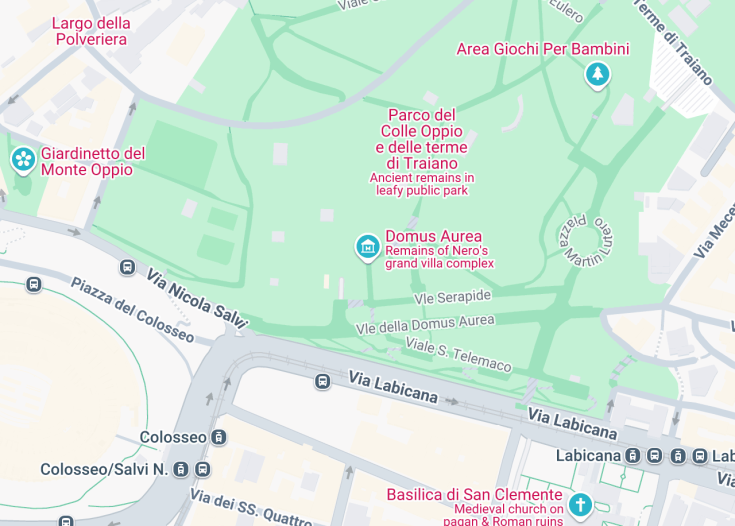The Domus Aurea, or “Golden House,” stands as a monumental testament to ancient Roman opulence and architectural ingenuity. Commissioned by Emperor Nero after the Great Fire of 64 AD, this extravagant palace features vast gardens, lavish halls, and stunning frescoes, reflecting the height of Roman luxury. Today, visitors can explore its intricate ruins, which provide invaluable insights into imperial Rome’s art, culture, and history, making it a must-visit destination for history enthusiasts in the heart of the Eternal City.
When visiting the Domus Aurea, consider booking guided tours in advance to gain deeper insights into its remarkable history and architectural details. This pre-planning can enhance your understanding of this iconic site, allowing you to fully appreciate its grandeur.
For those planning to explore the Domus Aurea, wearing comfortable footwear is essential, as the terrain can be uneven and challenging. Furthermore, be prepared for possible archaeological conservation work that might limit access to certain areas, which can fluctuate seasonally.
Domus Aurea: The Golden House of Nero
The Domus Aurea, or “Golden House,” is an ancient Roman palace built by Emperor Nero after the Great Fire of Rome in 64 AD. This opulent residence is significant not only for its extravagant architecture but also as a symbol of imperial power and luxury. Nestled on the Palatine Hill, the site showcases stunning frescoes, intricate mosaics, and lavish decorations that reflect the heights of Roman artistry. Visitors to the Domus Aurea can explore its fascinating ruins, which were once part of a sprawling complex of gardens and courtyards. The ambition behind its construction is evident in its sprawling size and elaborate design, which aimed to impress and instill a sense of awe. Despite its abandonment centuries ago, the palace remains a vital piece of history, attracting tourists eager to glimpse the extravagant lifestyle of ancient Roman emperors. Reveling in the grandeur of this historic site, visitors gain insight not only into Nero’s reign but also into Roman architectural ingenuity that still captivates modern audiences.
Exploring the Ruins of Domus Aurea
When visiting the Domus Aurea in Rome, there are several fascinating attractions to discover. One of the most captivating activities is the guided tours offered, which take you through the stunningly preserved sections of this once-lavish palace.
Frescoes and Mosaics
Marvel at the intricate frescoes that adorn the walls, showcasing vibrant colors and elaborate designs that speak to the artistic talents of the era.
Archways and Gardens
Stroll through the remnants of grand archways that provide a glimpse into the luxurious gardens that once surrounded the palace, revealing the connection between nature and architecture in Roman design.
Virtual Reality Experience
For a modern twist, some tours include a virtual reality component, allowing visitors to experience the home as it looked during Nero’s time. This innovative approach transforms a historical visit into an immersive journey.
An Interesting Fact about Domus Aurea
One intriguing aspect of the Domus Aurea is that its construction involved extensive use of gold leaf to decorate many surfaces, particularly in the frescoes. This lavish use of gold led to its nickname as the “Golden House.” Additionally, after Nero’s death, much of the structure was deliberately buried and forgotten, making the site’s rediscovery in the late 15th century a remarkable event in archaeology. This revitalization of interest not only rejuvenated enthusiasm for ancient Roman history but also spurred the Renaissance art movement, as artists were inspired by the remnants of this breathtaking establishment. Visitors today can appreciate how the legacy of the Domus Aurea influenced art and culture far beyond its original timeline.
Explore the Majestic Domus Aurea in Rome, Italy
Immerse yourself in the splendor of the Domus Aurea, a magnificent palace built by Emperor Nero after the Great Fire of Rome in 64 AD. This architectural marvel showcases stunning frescoes, mosaics, and grand halls, offering visitors a glimpse into the opulent lifestyle of ancient Rome. It is equally suited for history buffs, art enthusiasts, and casual tourists fascinated by the story of one of Rome’s most infamous emperors.
As you walk through the remains of this grand residence, you will encounter incredible features such as the vaulted ceilings adorned with intricate plasterwork and the expansive gardens, which were an innovation at the time. Highlights include the grand dining room, designed to give the illusion of a sky overhead, complete with luminescent stars painted in a mix of gold and other pigments. Those with an appreciation for archaeology will find the site’s ongoing restoration efforts captivating.
The Domus Aurea fits perfectly into a larger itinerary, allowing visitors to combine it with nearby attractions such as the Colosseum, Roman Forum, and Palatine Hill. Since it is often less crowded than more famous sites, it offers a peaceful escape from the bustling tourist routes of Rome, providing an intimate experience of the grandeur of the past.
For a unique perspective, consider joining a guided tour, which can enhance your understanding of the history and significance of the Domus Aurea. Tour guides often share lesser-known anecdotes and insights that enrich your visit, making it all the more memorable.
The Best Time to Visit Domus Aurea in Rome, Italy
The ideal time for visiting the Domus Aurea is during the spring (April to June) and fall (September to October) months. During these periods, the weather is generally mild, making your exploration of the ruins more enjoyable. Additionally, visitor numbers tend to be lower compared to the summer months, allowing for a more thoughtful experience of the site.
Special Events
Every summer, the Domus Aurea hosts special events and tours celebrating its historical significance. These immersive experiences often include guided tours, lectures, and workshops, providing a fantastic opportunity to engage with the site in a unique way.
Accessibility and Limitations
While the Domus Aurea strives to be accessible to all visitors, there are some limitations to be aware of.
Accessibility
Limitations
- Timed entry tickets are required, which can restrict immediate access.
- Flash photography is not permitted inside to protect the artwork.
- Large bags are not allowed and must be checked at designated facilities.
Notes to visitors
- Guided tours are available in multiple languages.
- Audio guides can be rented for a self-paced exploration.
- Plan for potentially cooler temperatures inside due to the underground location.
General Information
Details for your visit to the Domus Aurea
Location
Located near several notable landmarks, the Domus Aurea is conveniently situated for those wishing to explore ancient Rome. Nearby points of interest include the Colosseum, which is just a short walk away, and the Roman Forum, making it an ideal stop during your historic city tour.
Address:
Vle della Domus Aurea, 00184 Roma RM, ItalyVisiting Information
The Domus Aurea is open for visits, but it is advisable to check availability for specific time slots. Morning hours tend to be quieter, offering a tranquil experience in this ancient palace. Aim to visit early to avoid crowds and to fully appreciate the ambiance of this unique archaeological site.
How to Reach Domus Aurea from the City Center
Car
The Domus Aurea is easily accessible by car, with nearby parking options available for a nominal fee, ensuring a stress-free arrival.
| Route | Distance | Travel time |
|---|---|---|
| From Termini Station | 1.5 miles (2.5 km) | 10 minutes |
| From Piazza Venezia | 1 mile (1.6 km) | 5 minutes |
| From Vatican City | 3 miles (4.8 km) | 15 minutes |
Public Transport
The Domus Aurea can also be reached conveniently by public transport. The closest metro station is “Colosseo” on Line B. From there, it’s a mere 10-minute walk to the entrance.
| Route | Distance | Travel time |
|---|---|---|
| From Termini Station | 1.5 miles (2.5 km) | 20 minutes |
| From Piazza Venezia | 1 mile (1.6 km) | 15 minutes (walk) |
| From Vatican City | 3 miles (4.8 km) | 30 minutes (metro and walk) |
Nearby Attractions
- Colosseum – 0.5 miles (0.8 km)
- Roman Forum – 0.7 miles (1.1 km)
- Palatine Hill – 0.8 miles (1.3 km)
- Arch of Constantine – 1 mile (1.6 km)
- Piazza Venezia – 1 mile (1.6 km)
- Trajan’s Market – 1.1 miles (1.8 km)
- Pantheon – 1.3 miles (2.1 km)
- Vittoriano – 1.4 miles (2.3 km)
- Trevi Fountain – 1.5 miles (2.4 km)
- Spanish Steps – 1.7 miles (2.7 km)
- Vatican Museums – 2.2 miles (3.5 km)
- Borghese Gallery – 2.4 miles (3.9 km)
Common Questions
What is the history of the Domus Aurea?
What are the architectural features of the Domus Aurea?
What can visitors expect to see at the Domus Aurea?
How has the Domus Aurea influenced modern art?
What excavation techniques were used in uncovering the Domus Aurea?

Is the Domus Aurea in Rome, Italy Worth Visiting?
The Domus Aurea, or Golden House, is a fascinating representation of Ancient Roman history and architecture. As the lavish palace of Emperor Nero, it showcases the grandeur of Rome’s imperial era. Visitors can explore remnants of its stunning frescoes and intricate mosaics, which highlight the artistic achievements of the time. Additionally, guided tours often provide insightful narratives about the site’s history and significance, enhancing the overall experience. Despite being largely in ruins, the Domus Aurea’s unique vaults and underground chambers offer a captivating glimpse into the past. For those interested in archaeology and history, this site is a must-see, providing vital context to Rome’s evolution as a cultural epicenter. In conclusion, the Domus Aurea is highly recommended for tourists eager to connect with the rich legacy of Ancient Rome.









